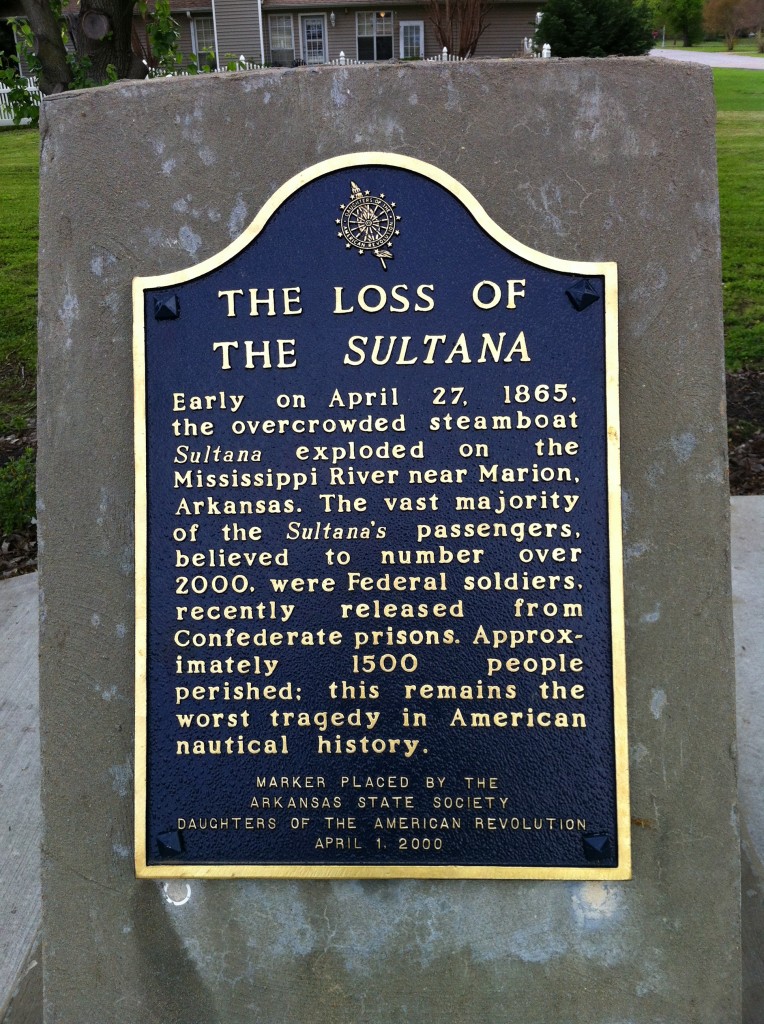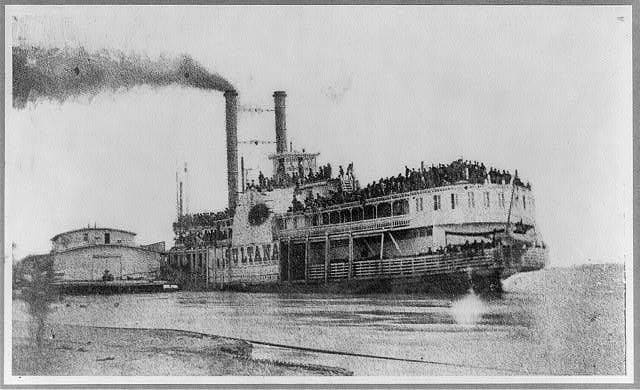April 27, 1865: The Greatest Maritime Disaster in US History
By Richard Salzberg © 2013
It was another of those impromptu Civil War roundtables on Wednesday night at the new library and it was going well. Egos and the one-upmanship remained generally in check, and everyone was attentive to the exchange of good information. Nobody knew who the attractive white-haired woman was; but she was respectful of the group, listened intently, and seemed knowledgeable.
As the topic veered to the treatment of prisoners of war and the respective conditions for North and South, it was iterated that the death rate for Southerners at places like Elmira and Point Lookout was indefensibly nearly as high as that for Northern prisoners at Andersonville. The woman agreed that the Federals had to share in the responsibility for the tragedy of Andersonville when they put an end to the prisoner exchanges, and particularly when Sherman could have liberated the poor souls when he came so close to the prison during his “march to the sea.”
The woman actually seemed to know a good deal about Andersonville. When a retired history teacher brought up the recent archaeological work there, she mentioned Providence Spring [http://ow.ly/mCusz]; and after a bit more of the statistical back-and-forth, she stated politely but unequivocally that one cannot be fully informed about Andersonville without knowing about the SS Sultana.
No one among the group of six or seven men (none of whom knew who the woman was) disagreed; and, if truth be told, few if any actually knew much about the tragic saga of that paddle-wheeled steamboat which once plied the Mississippi River. When the woman solemnly nodded and referred to “that old riverboat that sailed into hell with 1600 lost souls,” no one even thought of interrupting her.
“Lee surrendered on April 9, as we well know, and of course Lincoln was murdered on April 14. Then Joe Johnston’s army still in the field surrendered near Durham, and John Wilkes Booth was shot on April 26. The Sultana blew up on April 27. Although it remains the greatest maritime disaster in US History – ”
A man in a corduroy coat interrupted her. “ – the story was eclipsed by all the news just preceding it.”
For an instant the woman’s ice-blue eyes flashed with . . . something. Then she smiled and continued. “The Sultana left New Orleans on April 21. They were headed upstream at a time when the Mississippi was cold, running high and fast from the Spring melt-off, and soon they were having trouble with the boilers. When the boat docked in Vicksburg on April 24 – ”
“Vicksburg?”
“They had been contracted to pick up Union soldiers recently released from Andersonville, and some smaller Confederate prisons. And there were other soldiers just discharged who wanted to get home as fast as they could. The Federals were paying steamboats $5 per soldier for the trip to Cairo, Illinois.”
“That is fascinating,” the history teacher said.
A retired railroad worker spoke up, “It’s always all about the money.”
“While there,” the woman continued, “the captain decided to make cursory repairs to the boilers.”
“And they did a half-assed job.”
“Presumably,” said a crew-cut man who had not spoken before.
“Apparently,” said the woman. “But as is usually the case with such things, we’ll probably never be absolutely certain.’’
“Hell,” interjected a large man in a clean wrinkled shirt, “I still want ‘em to admit who really killed Lincoln.” The woman shot him a look, then smiled.
“Rather than replace the bad boiler they found, they did a quick patch for the leak and began the job of getting the soldiers on board.” She paused thoughtfully and touched her hair. “Now, we have to remember the state of most of these men. There hadn’t been time to recover from their deplorable experiences in the camps, and they just wanted to get home. The Sultana was legally permitted to carry 376 passengers. But by the time the boat left Vicksburg – along with scores of livestock brought up from New Orleans – there were more than 2400 people on board.”
“Incredible.” The man in the corduroy coat wrote something in his notebook.
The woman continued. “Emaciated men thronged every square foot on the boat. 2600 people and livestock crowded onto a steamboat with a seriously damaged boiler where less than 400 should have been. . .” She unfolded a piece of paper from her pocket and began to read: “The vessel was so densely packed that the crew had to shore up sagging upper decks with large timbers.”
“What did happen?” asked a man in a plaid shirt.“It blew,” said the railroad man.
“Sounds like the Maine,” commented the history teacher.
“I couldn’t hear you – the what?”
“The USS Maine. In Havana Harbor. 1898. ‘Remember the Maine.’ ”
“You mean sabotage?” The large man in the wrinkled shirt looked at the woman.
“We will never know,” she replied.
“Could have been sabotage,” the history teacher said. “Didn’t someone confess years later?”
“Whoa. . .” said the crew-cut man. “Think about it.”
“They were damn sure far enough down South.” It was the retired railroad man.
“The woman’s eyes flashed, then she shrugged. “We’ll never know.” 
The history teacher sighed. “That is so frustrating.”
“All we can be certain of is the loss and the bloody horror of it all. At least 1700 people died horribly – including civilians and children. We can talk about sabotage, and we can talk about corruption. But all we really know is that.
Another man spoke for the first time. “What do mean ‘corruption’ ”?
“In 2001,” she looked down at her paper, “Stephen Ambrose wrote that the steamboat captains were paying kickbacks of $1.15 to the Union officers to fill their boats with men.”
“My God. . .” The railroad man’s first instinct was to be angry. Then he just felt very sad. “When is anything ever going to change?”
The woman continued to read: “On the night of April 24, at 9 p.m., the Sultana departed Vicksburg and headed north on the flood-swollen Mississippi River. The enormous weight of the passengers and cargo on the decks had the crew worried. William J. Gambrel, part owner of the Sultana, and soon to die, warned the Federal officer in charge on the ship that any sudden movement by the prisoners could cause the decks to collapse, and too many men crowding to one side of the deck could result in the boat capsizing. That horrifying scenario almost played out when the Sultana docked briefly at Helena, Arkansas. Word quickly spread among the passengers that a photographer was setting up his camera on the west bank of the river. When many of the soldiers hoping to be in the picture caught on film quickly moved to the port side of the boat, the Sultana began to list dangerously.” She paused and looked around the table. “You can still see the photograph. Hundreds of men crowded on the top deck of the doomed vessel. It was the last image of the Sultana.”

“Unbelievable,” spoke the crew-cut man, almost as if to himself. “And they all thought they were going home at last.”
She began to read again. “The boat made several other stops on its ill-fated journey up the Mississippi. Then, in the early hours of April 27, at a point where the river was nearly four miles wide about seven miles north of Memphis, Tennessee, three of its four boilers suddenly exploded.” She paused and looked at the faces of her listeners, then said. “Here I quote: ‘The blast tore instantly through the decks directly above the boilers, flinging live coals and splintered timber into the night sky like fireworks. Scalding water and clouds of steam covered the prisoners who lay sleeping near the boilers. Hundreds were killed in the first moments of the tragedy. The upper decks of the Sultana, already sagging under the weight of her passengers, collapsed when the blast ripped through the steamer’s superstructure. Many unfortunate souls, trapped in the resulting wreckage, could only wait for certain death as fire quickly spread throughout the hull. Within twenty minutes of the explosion, the entire superstructure of the Sultana was in flames.’ ” The woman folded the paper and returned it to her pocket.
A man in glasses and a suit said simply, “More people died than on the Titanic.” The others turned to look at him. “History app,” he explained, holding up his cell phone; and he read from the small screen. “Passengers who survived the initial explosion had to risk their lives in the icy spring runoff of the Mississippi or burn with the ship. Many died of drowning or hypothermia. Some survivors were plucked from trees along the Arkansas shore. Bodies of victims continued to be found downriver for months, some as far as Vicksburg. Many bodies were never recovered. The Sultana’s officers, including Captain Mason, were among those who perished.”
“Captain J.C. Mason of St. Louis was a part-owner of the boat,” the woman added. “He should have known better.”
The man in the suit spoke again. “It says here a Sultana survivors group met every year on the anniversary of the tragedy until the last man died on March 4, 1931.”
Appreciative of the man’s contribution, the woman commented that there is still an active Sultana’s descendants’ organization. “This group could maybe contact them.”
The large man in the wrinkled shirt had been quietly reeling inside himself, feeling as if this strange white-haired, and – yes – beautiful woman and her story were affecting his life, beginning with what had been his relatively settled sensibilities before the meeting began. “Are you a member of that group?” he asked her.
Just then the library lights flickered on and off, indicating it was closing time. The Sultana’s story had engaged the impromptu Civil War roundtable group, and now that it was time to go, the woman easily stood up and thanked them for allowing her to join the discussion. Then she simply bid them goodnight. The men sat and stared as she turned and headed towards the stairs.
“Hey, wait a minute,” the heavyset man called, only thinking after the words had left his mouth. The woman stopped and looked back at him. “Um. . . I can walk you out.”
They passed through the library’s automatic sliding main doors and headed for the parking area. The lots were well lit, but the moonless night was dark and all absorbing. The man was wishing they had taken the elevator instead of the stairs, for he was breathing hard and embarrassed by that. He paused to take a deep breath, trying to act if it was a thing he always did.
The woman smiled at him. “I’m just over here,” she said.
“Okay,” the man replied. He fumbled for his keys in his pockets, then in his bag, desperate to maintain her attention. Once found (in one of his rear pockets), he dropped them in the grassy median. “Damn!” he said. “I’m sorry. . . ” he looked sheepishly at her. “I don’t usually curse.” Then, praying for a speedy recovery, he bent over to find the keys. “I’ll be right there.” He was relieved to see a small surface reflected in the parking lot lights, but it turned out to be a damp candy wrapper. He continued to search until he was able to say at last, “Ah, here we go – ”
But when he stood up, the woman was gone. Still breathing heavily, he looked around as far as he could see, but the woman was nowhere to be seen.
– Finis –
____________________________________________________
Some References:

